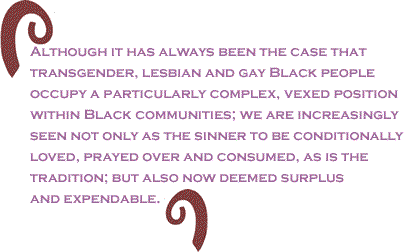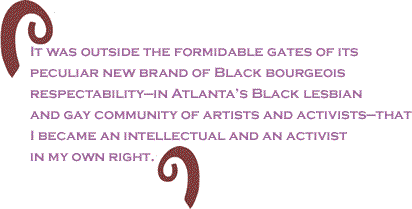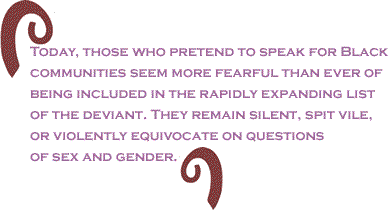
|
|||||||||||||||||||||||
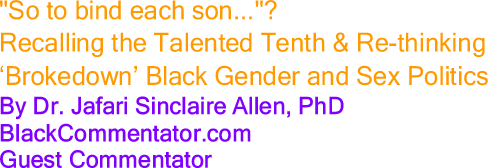 |

Custom Search
|
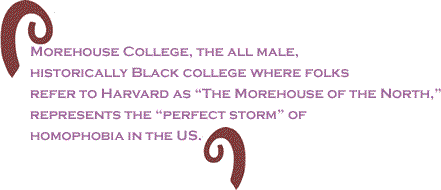 |
The recent article titled "Morehouse College faces its own bias – against gays" in the Los Angles Times, by Richard Fausset, bookends the recent history of homophobia and gay articulation at Morehouse with the heinous 2002 baseball-bat beating of a Morehouse student, Greg Love, by a dormitory mate, Aaron Price, and the historic “No More ‘No Homo’ ” events organized by Michael Brewer and members of the campus organization, Safe Space, in April of this year. For me, this recalls memories that I had put away, but which provide the foundations of my life as a scholar and activist. Morehouse College, the all male, historically Black college where folks refer to Harvard as “The Morehouse of the North,” represents the “perfect storm” of homophobia in the US. That is, the volatile combination of the racial and class anxieties of “exceptional Negroes,” masculine gender trouble in a single sex school within the co-ed environment of the Atlanta University Center; class conflict; and, of course, fundamentalist religious baggage. These seas roil and skies open up in an international climate of heterosexism and misogyny. The homophobic violence there is therefore instructive, dramatic and sad, but not rare in our world. After more than four years matriculation without a Morehouse degree, I learned a great deal about classism, heterosexism and homophobia. It was there that I confronted the fear of who I would become [an openly or “out” Black gay man]. It was there that I learned to speak this. And where I was punished for it. Although
it has always been the case that transgender, lesbian and gay Black
people occupy a particularly complex, vexed position within Black
communities; we are increasingly seen not only as the sinner to
be conditionally loved, prayed over and consumed, as is the tradition;
but At Morehouse, I was a member of KMT, an “Afrikan fraternity” that promised an end to the abuses of the Greek system, which has not only seen perennial scars and broken bones, but the death of my friend Joel, while pledging Alpha Phi Alpha at Morehouse. KMT represented a return to community service and scholarship and a new afrocentric Black masculinity marked by respect for women. We budding afrocentrists lived our lives as an incisive critique of the bourgeois milieux most of us had lived in and under [and where most of us now, more or less comfortably, reside]. We fought for Black Studies, insisted on wearing our kente cloth, headwraps and twists long before it became chic; mentored youth in the “blighted” communities that literally surrounded the Atlanta University Center; wrote poetry about revolution; exposed our classmates to Diop, Fanon, Memmi, Davis… ; and joined other organizations working toward Black Liberation. I earned the name Jafari among these brothers. We were enraged – at least theoretically-- by violence against women, inside and outside our ranks. We considered ourselves to be exemplary men. Not just good brothers, but very good brothers. Still, by the time the scene that Richard Fausset recalls in his story in The Los Angeles Times, in which Lance McCready, Craig Washington and I fled Sale Hall Chapel in fear unfolded; the radical political and cultural project in which my fraternity brothers and larger community of “conscious” students thought we were engaged in, had already begun to fail. The impulse of the project was honorable, for the most part. Just tragically flawed and not so radical after all. The radical acts were happening-- as I have learned, radical acts do - on the other side of the gates.
I felt and participated in radical Black politics only after being once removed from this Black cultural nationalist kinship. It was outside the formidable gates of its peculiar new brand of Black bourgeois respectability—in Atlanta’s Black lesbian and gay community of artists and activists—that I became an intellectual and an activist in my own right. We supported each other as we healed from various wounds received within our communities and families; railed against homophobia at Morehouse in front of MLK’s tomb at the King Center; paraded with the African American Lesbian and Gay Organization of Atlanta [AALGA], established the Coalition of African Descent, Second Sunday; and Craig’s A Deeper Love Project at AID Atlanta; and marched down Peachtree Street and in Washington, DC, for more HIV prevention and care dollars, for an end to violence against women, gays and lesbians in our homes and our streets; and even organized and attempted to charter what I believe was Morehouse’s first gay and bisexual organization, Morehouse Adodi. We did our work to save our own lives and communities. We had to—wasn’t nobody else going to do it for us. Nobody else cares that we are dying. While my reading list did not change much, the new way I read - critically, synthetically-- shifted like tectonic plates finally clicking into place to make another country, where I might one day live. My memory of that evening in Sale Hall rings staccato in my minds ear. We arrive at Sale Hall Chapel. Lance and Craig, who had not attended Morehouse, look around a lot at the glares and sideways glances. The chapel fills up quickly, and not with our friends. The crowd roils. The noise level rises. For the first time, I feel physically vulnerable on this campus, among my brothers. Craig signals to Lance as the program is called to order. No order, someone yells “faggots!” Lance and Craig get into position. Lance says “let’s go.” We do. Some fifteen years later, in the Fall of 2007, I returned to campus for the first time since we shuttled ourselves out of Sale Hall, in fear. I had left Atlanta years ago. I had been places and accomplished things. I have a family that loves and accepts me without condition. I am happy and confident and in love. Still, the moment I stepped on campus, that same old feeling returned. Skin turned to tracing paper. Momentarily, I became that twenty-something boy with thin skin and sharp tongue again. Those same mixed feelings. I still recall my lessons at Morehouse. Reading Durkheim, Weber and Wallerstein in a few of the classes I actually attended, prepared me for my second act as an undergrad, and graduate school. I am sure the professors that dutifully flunked me out would be surprised to see that I have become a Social Scientist, having underperformed in all of my classes, distracted as I was by the social dramas and politics of my own life. More than the formal curriculum, I remember the jokes and offhand comments in class. For example, that Abraham Lincoln Davis asked the student charged with writing a Civil Liberties class paper on Gay Rights [the others included rights of prisoners, rights of differentlyabled, etc.] to write the paper, “not… become one.”
Imagine my surprise, pride and long-awaited pleasure when I walked into Nabritt-Mapp-McBay, just across the green from Sale Hall, to see the glittering young trans, lesbian, gay, bisexual and allies’ faces waiting to greet me and a panel of other folks, in the Fall of 2007. Never mind the fact that they reportedly searched in vain all over the Atlanta metroplex for an “out” alumnus/a to address them, along with prominent non-Morehouse folk including my friend, David Malebranche - these students nearly filled the lecture room, fearless and bright, but most of all hungry. And ready. They were new children: Afrekete, the organization at Spelman, and Safe Space, at Morehouse. We had Revival that night. The old was exorcised. The spirits of those who figuratively, or quite literally, did not survive — roused. As Fausset reports, these new, relatively loud children are the post- Love/Price students for whom the tradition of silence will not do. But what is ahead for them, in this rare and beautiful Black proving ground, and beyond? Understanding the boundaries, fault lines and rules of inclusion and exclusion in the Black public sphere has always been important for those whose participation in families or larger publics seem contingent on their own practices of model citizenship - that is, serving well and in silence. The central example I am thinking about here is of course that of Black women - as laborers, organizers, lovers, mothers, bakers, ‘other women’; but until recently and not without tremendous backlash, rarely recognized in fact as leader, theoretician, strategist, savior. They have certainly been the latter for me, and for Doug, who never got the opportunity to speak or not speak for himself, but rather was cast away with me as an afterthought by KMT. I first learned the radical politics of the Black feminism - including “to struggle with our brothers against racism” and still with us, holding brothers accountable for our gender privilege, according to the Combahee River Collective--not from class, but from the way my friend Amy defended me, how she and Kara, Jeri, and La Tanya dusted me off, took me in, and called my new gay self valuable and beautiful, before any man loved me. I learn it everyday from Tayari Jones. Her words in my ear chasten me to “level with…” the hurt and hard facts, even as I reach to something else. I am also thankful for the grace and warmth my college girlfriend has shown me, now that the curtain has fallen on our drama. Personally, I have been exceedingly fortunate - blessed. It is not this way for most of us. Today, those who pretend to speak for Black communities seem more fearful than ever of being included in the rapidly expanding list of the deviant. They remain silent, spit vile, or violently equivocate on questions of sex and gender. Witness the strikingly resonant rhetorics of folks for whom there is agreement on only two things: getting paid and homo/trans-hate. Reactionary US state officials; Christian, Muslim, National and other patriarchs; platinum-selling rappers; award-winning gospel singers; middle-class gatekeepers; and pious ex-gays; all call for queer ouster, hetero-conversion, silence, and/or death. Witness HNIC’s in academe, in corporate America, in social organizations, who dare not utter our names without contempt or PC qualification, or focus-grouped “tolerance” speech, while, as one of our gay Harlem Renaissance brothers Claude McKay, tells us, “…’round us [all Black folks] gather the murderous lot.”
This personal meditation, is therefore dedicated to Madame Edna Brown, who once described herself to me as a middle aged southern church lady. Whether playing piano at church, working at Morris Brown College in the music department, or hosting the weekly drag shows at Loretta’s—a gay bar on a side street with a dark side entrance and a long line of Black men and women with baseball hats and hoods; she was a proud Black woman, born a boy. Her body was found days after she had been robbed and murdered. It is for Keiron, whom I did not have the pleasure to know. He bravely picked up Morehouse Adodi, where I had left it when I finally fled, to get my life. We are all infected with homophobia, which we know is the leading cause of AIDS. This beautiful young man died in 2002 from it, like too many others to list. . … It is dedicated to Sakia Gun, fifteen years old, who survived the perils of Newark, until the night she defended friends from the advances of brothers to whom they told they were lesbians and not interested. Finally, I am thinking of the young Morehouse brother Love, bludgeoned until unconscious by young brother Price. So, even as Michael Brewer and many of those students at the forum that night, like me, are moving on beyond the yard, what now? What would our Ancestors have us do now, as Essex Hemphill admonishes, “If we have to take tomorrow… ”Here’s a Selected Reading list of texts to help us continue and elevate this conversation. The list includes anthologies, poetry and three scholarly works written to be accessible to audiences outside of academe. • Brother to Brother: New Writing by Black Gay Men. 2007 [1989] [ New Redbone Press Edition, with Introduction by Jafari Sinclaire Allen and Afterward by Chuck Tarver] • Cathy Cohen, “Deviance as Resistance: A New Research Agenda for the Study of Black Politics . In Du Bois Review: Social Science Research on Race, 1:1 • Cathy J. Cohen. The Boundaries of Blackness: AIDS and the Breakdown of Black Politics • Combahee River Collective. “Combahee River Collective Black Feminist Statement” in The Black Feminist Reader. Joy James and T D Sharply-Whiting, Eds. • Homegirls: A Black Feminist Anthology, Barbara Smith, Editor • Joy James Transcending the Talented Tenth • Marvin K. White “Nothing Ugly Fly” • Spirited: Affirming the Soul and Black Lesbian and Gay identity • Voices Rising: Celebrating 20 Years of Black Lesbian, Gay, Bisexual and Transgender Writing *
Taken from Morehouse College hymn lyrics “…true forever
to old Morehouse may we be, so to bind each son the BlackCommentator.com Guest Commentator, Dr. Jafari Sinclaire Allen, PhD is an Assistant Professor, Department of Anthropology of the University of Texas at Austin. Additional affiliations: Lozano Long Institute of Latin American Studies, Center for Women's and Gender Studies, Center for African and African American Studies. Click here to contact Dr. Allen. |
Any BlackCommentator.com article may be re-printed so long as it is re-printed in its entirety and full credit given to the author and www.BlackCommentator.com. If the re-print is on the Internet we additionally request a link back to the original piece on our Website. Your comments are always welcome. eMail re-print notice
If you send us an eMail message we may publish all or part of it, unless you tell us it is not for publication. You may also request that we withhold your name. Thank you very much for your readership. |
| |
| August 28, 2008 Issue 288 |
|
| Executive Editor: Bill Fletcher, Jr. |
| Managing Editor: Nancy Littlefield |
| Publisher: Peter Gamble |
| Est. April 5, 2002 |
Printer Friendly Version
in resizeable plain
text format or pdf
format. |

|
 |
 |
 |
| |
| |





























